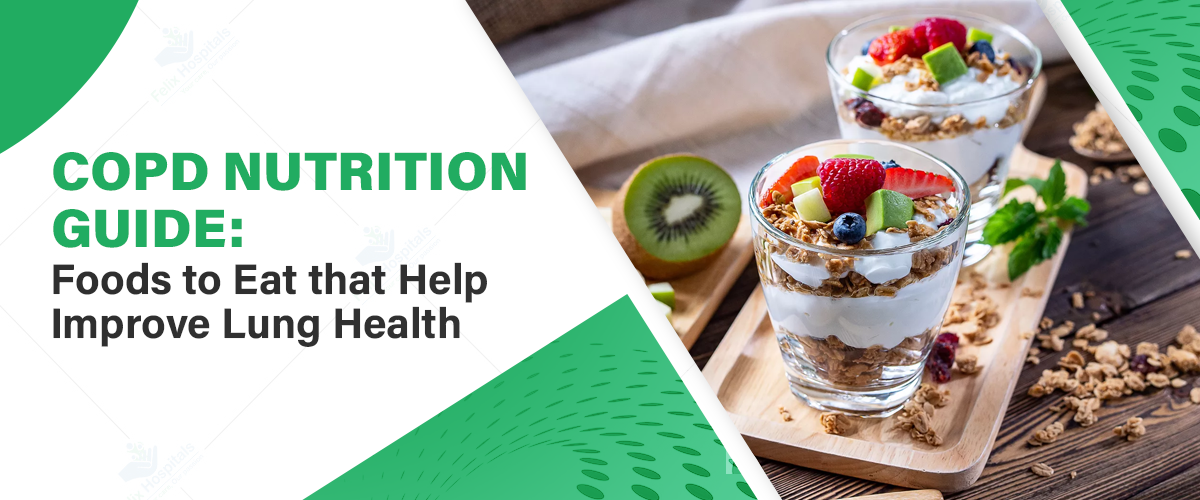
Subscribe to our

Chronic Obstructive Pulmonary Disease (COPD) can significantly impact your quality of life, making it essential to adopt strategies that enhance lung health and overall respiratory function. Nutrition plays a crucial role in managing COPD and improving lung capacity. This guide explores the importance of diet in supporting respiratory health and provides actionable dietary tips for better lung health. If you’re seeking advanced care, the best hospital for lung disease treatments is here to help you breathe easier and live healthier.
Take the first step towards better lung health. Contact Felix Hospitals today by Calling +91 9667064100!
Proper nutrition is essential for managing COPD and other lung-related conditions. The right diet can:
Improve Lung Function: Nutrients like antioxidants and vitamins reduce inflammation and support tissue repair.
Boost Energy Levels: COPD can increase the effort needed to breathe, requiring more energy. A balanced diet ensures you meet these increased energy demands.
Strengthen Immunity: A well-rounded diet can help prevent respiratory infections exacerbating COPD.
Maintain a Healthy Weight: Being overweight can strain your lungs, while being underweight may weaken your respiratory muscles.
Nutrition is pivotal in maintaining and enhancing lung health, especially for individuals managing lung disease and respiratory health. Including the right foods in your diet can reduce inflammation, improve lung function, and provide essential nutrients that support the respiratory system. Here's a detailed guide on foods that promote better lung health:
Fruits and vegetables are packed with antioxidants, vitamins, and minerals that help combat oxidative stress and inflammation in the lungs. Consuming a variety of these can also boost your immune system, protecting you against respiratory infections.
Berries: Blueberries, raspberries, and strawberries are rich in anthocyanins, antioxidants that protect lung tissues.
Leafy Greens: Spinach, kale, and arugula provide vitamins like A, C, and K, crucial for lung repair and maintenance.
Citrus Fruits: Oranges, grapefruits, and lemons are high in vitamin C, which supports immune health and reduces inflammation.
Other Vegetables: Bell peppers, carrots, and broccoli are excellent sources of beta-carotene and antioxidants, promoting better oxygen uptake.

Whole grains are low in saturated fat and high in fiber, making them an excellent energy source without causing inflammation in the body. They also regulate blood sugar levels, preventing spikes that can worsen lung conditions.
Brown Rice: A nutritious alternative to white rice, providing magnesium for lung function.
Oats: High in soluble fiber, oats help improve digestion and provide sustained energy.
Quinoa: Rich in protein and amino acids, quinoa supports muscle health, including respiratory muscles.
Healthy fats, especially omega-3 fatty acids, have anti-inflammatory properties that can help reduce airway inflammation and improve lung function.
Fatty Fish: Salmon, mackerel, and sardines are rich in omega-3 fatty acids and help improve oxygen flow to the lungs.
Nuts and Seeds: Flaxseeds, chia seeds, and walnuts are plant-based sources of omega-3s that also provide fiber and essential minerals.
Avocado: A rich source of monounsaturated fats, avocados support overall cardiovascular and lung health.
Protein is essential for muscle strength, including the diaphragm and other respiratory muscles. A diet rich in lean proteins ensures that the body has the resources to repair and maintain tissues effectively.
Poultry: Chicken and turkey are low-fat protein sources that help build and repair tissues.
Fish: Besides omega-3s, fish provides lean protein essential for overall health.
Legumes: Lentils, chickpeas, and black beans are high in protein and fiber, promoting muscle health and aiding digestion.
Hydration is key to maintaining thin mucus in the lungs, which makes it easier to breathe and reduces the risk of lung infections. Along with drinking plenty of water, include water-rich foods in your diet:
Cucumbers: Hydrating and refreshing, they are low in calories and high in water content.
Watermelon: Provides hydration and is a good source of antioxidants.
Soups and Broths: A warm and comforting way to stay hydrated, soups made with healthy ingredients can also boost immunity.
Herbs and spices not only add flavor to your meals but also offer anti-inflammatory and antioxidant benefits that support lung health.
Turmeric: Contains curcumin, a powerful anti-inflammatory compound that helps alleviate respiratory inflammation.
Ginger: Known for its soothing properties, ginger can help reduce airway inflammation and improve lung function.
Garlic: Packed with allicin, garlic has antimicrobial properties that may protect against lung infections.
Peppermint: Helps relax the muscles of the respiratory tract, improving airflow and easing breathing.

To maximize the benefits of these foods, combine them with a balanced lifestyle that includes regular exercise, adequate sleep, and stress management. Cooking methods also matter—steaming, grilling, or baking are healthier options than frying.
Felix Hospitals is dedicated to providing holistic care for patients with lung diseases, offering expert medical advice, nutrition counseling, and personalized treatment plans. Our state-of-the-art facilities and compassionate team make us the best hospital for lung disease treatments.
Comprehensive care for COPD, asthma, and other lung conditions
Advanced diagnostic and treatment technologies
Collaborative care involving pulmonologists, dieticians, and therapists
At Felix Hospitals, we are proud to house some of the Best Pulmonologists In Noida and respiratory health.
Dr. Pooja Yadav: Specializes in creating COPD-friendly meal plans.
Dr. Nida Zafar: Known for personalized nutrition strategies for lung health.
Dr. Shivani Ahlawat: Expert in balancing nutritional needs with COPD management.
Dr. Priyadarshi Jitendra Kumar: With over two decades of experience, he specializes in treating COPD, asthma, and other chronic lung diseases.
Let us help you breathe easier and live better. Schedule a consultation with our expert pulmonologists and dieticians at Felix Hospitals by Clicking Here.
Managing COPD and other respiratory conditions starts with the right nutritional choices. Incorporating lung-friendly foods into your diet can significantly improve your respiratory health and overall well-being. For those seeking expert care and advice, Felix Hospitals is your trusted partner, offering tailored solutions and advanced treatments. Whether you’re managing COPD or seeking information on lung cancer treatment costs in Noida, Felix Hospitals is here to guide you every step of the way.
Q- How can a high-protein diet improve respiratory muscle function in COPD patients?
ANS: A high-protein diet helps strengthen the diaphragm and other respiratory muscles, which are crucial for effective breathing. Proteins repair muscle tissues and support overall energy needs in individuals with increased respiratory effort.
Q- Are there any specific fruits or vegetables that help reduce mucus production in the lungs?
ANS: Pineapple and papaya contain enzymes like bromelain and papain, which can help reduce mucus and inflammation in the respiratory system. Leafy greens like spinach are also beneficial due to their vitamin K content.
Q- Can omega-3 fatty acids directly improve symptoms of chronic lung inflammation?
ANS: Yes, omega-3 fatty acids found in salmon, flaxseeds, and walnuts have anti-inflammatory properties that can help reduce airway inflammation, a common issue in COPD and other lung conditions.
Q- How does staying hydrated affect mucus thickness in COPD patients?
ANS: Proper hydration keeps mucus thin and less sticky, making it easier for the lungs to expel, which reduces the risk of infections and breathing difficulties. Water-rich foods like cucumbers and watermelon can aid in hydration.
Q- Are there specific herbs or spices that can act as natural bronchodilators?
ANS: Herbs like thyme and spices like turmeric and ginger have natural anti-inflammatory and bronchodilator properties. They can help relax the airways and improve airflow, especially in people with COPD.
Q- What role does magnesium play in lung health, and which foods are rich in it?
ANS: Magnesium is vital for muscle relaxation, including the bronchial muscles, which can ease breathing. Foods like nuts, seeds, quinoa, and dark leafy greens are excellent sources of magnesium.
Q- Can COPD patients benefit from intermittent fasting or meal-timing strategies?
ANS: Controlled meal timing can help manage bloating and reduce pressure on the diaphragm, improving breathing. For example, eating smaller, frequent meals prevents fullness and allows easier lung expansion.